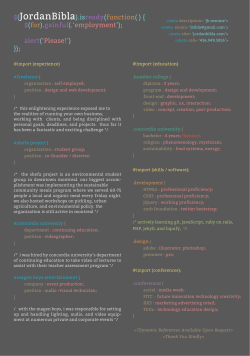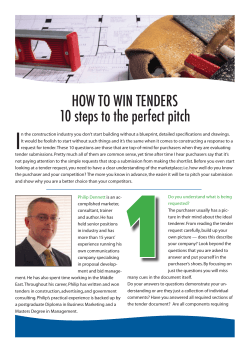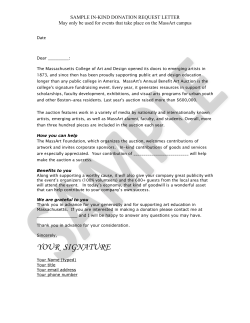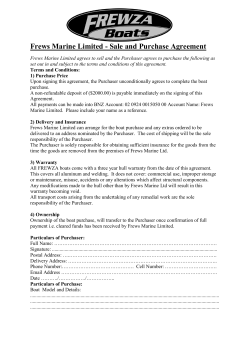
How to Sell Your Business Tips and advice from Meta Corporate Finance
How to Sell Your Business Tips and advice from Meta Corporate Finance About Meta 1 Meta is a regional specialist corporate finance adviser with a focus on the south-east of the UK but with international reach. Our founders were big four trained but have run their own business since 1999. Meta focuses on liquidating wealth, largely for owner managers, by supporting the exit aspirations of shareholders and the ownership aspirations of management teams. Our approach 2 Meta does not follow a traditional auction process in all circumstances. Cranking the handle of the auction machine does not always (and rarely, right now) provide the right answer for our clients. Meta is very experienced in guiding shareholders through what might be the most important transaction of their lives. The four key stages to selling your business 3 Value (£££) Planning & preparation Marketing Due diligence Legal 1 2 3 4 Traditional auction Una dvis ed p • Structuring for sale • Understand the business and impact of the sale • Information memorandum • Deal with current approach • Research all potential acquirers • Confidentiality agreement • Presentation of the business in best light Appoint Meta • Approaches to one or more acquirers • Meetings & discussions • Offers • Negotiations • Financial DD • Commercial DD • Legal DD • Data room • More discussions Heads of agreement roce ss • Sale and purchase agreement • Warranties • Employment contracts • Disclosures • Sundry documents • Transfer issues • Personnel • Market announcements Completion Stages can be differing lengths. Stage 1 should be spread over a number of years for a company that is very strategically focused on maximising shareholder value. 4 How to sell your business for the best price in the current market The current market needs a more intelligent approach to selling a business and finding a purchaser who can and will pay a sensible price. On a common sense basis, don’t sell your business when you want to sell, but when someone wants to buy. But how can you influence that? It may be possible to develop longer term strategic discussions with the purchaser who then wants to or must buy you rather than you just putting up the ‘For sale’ sign. The extra steps you can take include: • Structure and plan your transaction to minimise tax • Identify and address potential issues affecting value upfront • Emphasise and communicate key value drivers to the potential purchaser • Make sure the organisation can thrive without you • Develop the strategic purchaser who will pay a premium price It may not be possible in the current market to use a traditional auction process to achieve the best price, often more subtle procedures are required. Meta is very experienced in achieving the right outcome for clients, however long that may take. This may include consideration of all the alternatives, including a sale to the management team, a buy-in or an equity release. 1 2 3 4 Planning & preparation Marketing Due diligence Legal Total process time: six months or more 5 Stage 1: planning & preparation In the sense that proper planning and preparation prevents a certain (low) level of performance, homework is all important. Not just the information memorandum but proper pre-due diligence by which we mean identifying and dealing with all the issues upfront before they are exposed to potential purchasers. Also, get the team in order: Appoint lawyers to review contractual documentation and appoint tax advisers to agree structuring up front. It is important that your adviser should understand both shareholder personal objectives and the corporate objectives to ensure that one does not override the other. ‘Business as usual’ is an important mantra, even for a shareholder who is keen to sell. You and your adviser should evaluate the business’s market positioning as compared to its competitors and research potential purchasers, including internationally, plus private equity. This will create a strong basis for discussion with those parties who pass through confidentiality procedures. 6 Stage 2: marketing Traditionally, once the agreed target list has been developed, parties are approached and processed through confidentiality so that a full information pack can be given to them. The confidentiality agreement process sets the tone for future negotiations which are then expected to be professional and robust. The auction process can be very controlled with hard bid deadlines leading to heads of terms and exclusivity for one or more bidders. In the current financial market it may be necessary for discussions with interested parties to be developed over time and not forced through a rigorous process. A number of transactional alternatives may need to be explored at the same time to ensure that there is a maximum opportunity to meet all the shareholder objectives. Longer term, strategic relationships may need to be developed in a process that might be seen as more courtship than speed-dating. 7 Stage 3: due diligence The due diligence process is all important to both sides of a transaction and thus there is no difference between traditional methodology and that which needs to be applied in the current market place. Preparation is absolutely the key and hard work at this stage can substantially reduce the possibility of a transaction failing later. Vendor due diligence (VDD) should be considered for larger transactions. This is a process where the vendor engages advisers who prepare a due diligence report to be given to interested parties. Interested parties can then engage extended or top up due diligence if they so desire. VDD has two parts: it can seriously limit the sort of internally generated breaches of confidentiality that will be caused by external advisors appointed by the purchaser stomping all over your business. Secondly, it ensures nothing is hidden that becomes a deal breaker much later. The use of technology in a virtual dataroom also can ensure less disruption of the business and is now a common feature of sale transactions. There must be a seamless link between flow of due diligence information and the disclosure process in which all advisers must work together; disclosure is not just a lawyer’s process. 8 Stage 4: legal completion The legal process must be in a controlled overlap with the due diligence process and momentum must be sustained all the way to completion. It is important to focus on the critical issues and not to get distracted by the legal ‘noise’. The culmination of the legal process and lengthy drafting discussions and negotiations is usually a table full of so much paper you will not believe that there could possibly be so many issues that could relate to your company. Far too many deals get completed in the middle of the night and this is best avoided because decisions can be made by tired brains. This also means that deals complete outside banking hours and there is often a delay before the cash hits your account. Now you can pop corks and not before. If you do this at an earlier stage (e.g. at heads) it will almost certainly be premature and you will be disappointed! 9 Key components for the extraction of value The following steps can be taken to ensure a successful process: Meta preparation • It’s never too early to start the process; get advice well in advance • Management structure; depth and strength • A business plan projecting beyond sale • Maximise profits not shareholder income: the capital gain is greater and the tax less • Tax structuring and wealth management • Regulatory compliance, accreditation and certification Meta research • Fully evaluate all potential purchasers before information is given to them • Differentiate competitors, parallel sectors, strategic trade and private equity interest • Research past deal activity and performance/behaviour in past processes • Provide clear value parameters and expectation • Be very clear on the decision to move forward before going to market Meta control • Playing the field and timing: approaches, trade, MBO • Information memorandum to suit purpose • Prepare management presentation upfront • Dataroom control and transaction timetable management • Meet purchasers before they price the business as well as afterwards Meta management • Seamless management of due diligence process into disclosure • Manage all advisers together to a single end • Manage the production of legal documentation in a timely but sensible fashion • Manage the legal drafting to be appropriate to the transaction to prevent fundamental disagreement • Manage the balance of disclosure process, warranties and indemnities to mitigate downside post transaction risk If you have any questions about selling a business or would like to discuss how we can help, please call Mark or Peter on 01892 822228. Meta Corporate Finance Limited Hop House Lower Green Road Pembury Tunbridge Wells tn2 4hs t f e w +44 (0)1892 822228 +44 (0)1892 825444 admin@metacf.co.uk metacorporatefinance.co.uk ©2013 Meta Corporate Finance Limited Regulated by The Institute of Chartered Accountants in England and Wales for a range of investment business activities Registered in England: 3766866 Registered office: 12 Lonsdale Gardens, Tunbridge Wells, Kent tn1 1pa
© Copyright 2025





















